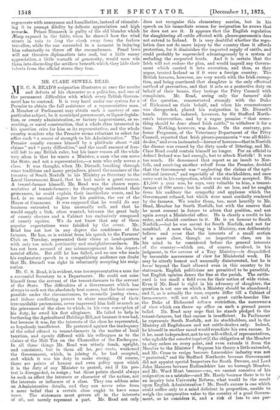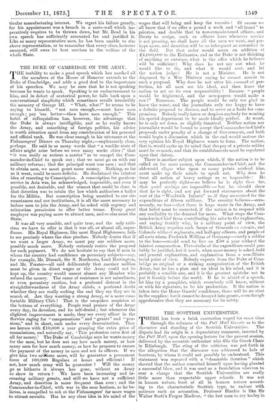MR. CLARE SEIVELL READ.
ATIZ. C. S. READ'S resignation illustrates at once the merits .1.11 and defects of his character as a politician, and one of
the permanent difficulties with which every British Govern- ment has to contend. It is very hard under our system for a Premier to obtain the full assistance of a representative man. A Member of Parliament may obtain such a mastery of one particular subject, be it municipal government, or liquor-legisla- tion, or county administration, or factory improvement, or re- cruiting, or naval construction, that a whole class interested in his question cries for him as its representative, and the whole country wonders why the Premier seems reluctant to select for office such " a source of strength to his Administration." The Premier usually excuses himself by a platitude about " old claims " and " party difficulties," and the small amount of free- will left to any British ruler, but his inner reason all the while very often is that he wants a Minister, a man who can serve the State, and not a representative,—a man who only serves a class. It was thought, when Mr. Disraeli, breaking through some traditions and many prejudices, placed the nominee of the tenantry of South Norfolk in his Ministry as Secretary to the Local Government Board, that he had made a great success. A tenant-farmer himself, Mr. Read was the chosen repre- sentative of tenant-farmers ; he thoroughly understood their grievances, he could explain their inarticulate wants, and he had, in an unusual degree for his position, the ear of the House of Commons. It was supposed that he would do any business entrusted to him unusually well, and that he would supply a link, often wanted, between the great body of county electors and a Cabinet too exclusively composed of county squires. We do not know that any of these popular expectations were falsified by the event. Mr. Read has not lost in any degree the confidence of the farmers. He has, as is evident from his speech to the Farmers' Club on Tuesday. represented their views at head-quarters with only too much pertinacity and straightforwardneSs. He has not been accused of any mismanagement in his depart- mental affairs. But still he has failed, and no one who reads his explanatory speech to a sympathising audience can doubt that Mr. Disraeli was right in reluctantly accepting his resig- nation.
Mr. C. S. Read, it is evident, was too representative a man for a successful Secretary to a Department. He could not raise himself from the servant of the tenant-farmers to the servant of the State. The difficulties of a Government which has always to seek not the absolutely best course, but the best course possible under the circumstances, to reconcile jarring views, and induce conflicting powers to abate something of their irreconcilable pretensions, never impressed him half as much as the grievances of the class to which, in his own conception of his duty, he owed his first allegiance. He failed to help in furthering the Agricultural Holdings Bill,not because it was bad, but because it was, for the interests of the class he represented, so hopelessly insufficient. He protested against the inadequacy of the relief offered to tenant-farmers in the matter of local taxation, and openly differed with his colleagues as to the claims of the Malt Tax on the Chancellor of the Exchequer. In all these things Mr. Read was utterly frank, upright, and consistent, but in them all he, pro tanto, weakened the Government, which, in joining it, he had accepted, and which it was his duty to make strong. Of course, there are points of honour and even policy upon which it is the duty of any Minister to protest, and if his pro- test is disregarded, to resign ; but those points should always be such as affect the interests or character of the nation, not the interests or influence of a class. They can seldom arise on Administrative details, and they can never arise from a mere belief that a certain class ought to have some more. The statesman must govern all in the interests of all, not merely represent a part. Mr. Read not only
does not recognise this elementary maxim, but in his speech on his immediate reason for resignation he avows that he does not see it. It appears that the English regulation for slaughtering all cattle affected with pleuro-pneumonia does not extend to Ireland. It is very doubtful whether the regu- lation does not do more injury to the country than it affords protection, for it diminishes the imported supply of cattle, and could probably be superseded advantageously by a system of secluding the suspected herds. And it is certain that the Irish will not endure the plan, and would imperil any Govern- ment which carried it into execution, and thus, as they argue, treated Ireland as if it were a foreign country. The British farmers, however, are very wroth with the Irish exemp- tion, and being convinced that slaughter is the only effectual method of prevention, and that it acts as a protective duty on behalf of their beasts, they besiege the Privy Council with complaints. Mr. Read, seeing only the farmers' side of the question, remonstrated strongly with the Duke of Richmond on their behalf, and when his remonstrance was disregarded, placed his resignation in Mr. Disraeli's hands. He was induced, however, by Sir Stafford North- cote's intervention, and by a vague promise " that some- thing should be done about Irish cattle," to withdraw it for a time. Nothing, however, was done. On the contrary, pro- fessor Fergusson, of the Veterinary Department of the Privy Council, reported that Irish pleuro-pneumonia "was all fiddle- de-dee," and even insinuated—horror of horrors—that in Norfolk the disease was caused by the dirty mode of littering, and Mr. Clare Read could contain himself no longer. For an official to defend Ireland was bad enough, but to attack Norfolk! It was too much. He denounced that report as an insult to Nor- folk, and receiving another rebuff from the Premier, decided that the Government was " neglecting the claims of the agri- cultural interest," and especially of the stockholders, and once more sent in his resignation, which was this time accepted. His £1,500 a year was, he says, very valuable to him, a tenant- farmer of GOO acres ; but he could do no less, and he sought from his auditory the sympathy and applause which the Government refused, but which were most cordially rendered by the farmers. We render them, too, most heartily to Mr. Read, Member for South Norfolk, but with the reserve that he must consent in future to adorn that position, and not again accept a Ministerial office. He is clearly a credit to his order, and should continue in it. He is an honour to South Norfolk,—but he was meant for South Norfolk, and not for mankind. A man who, being in a Ministry, can deliberately believe and avow that the interests of a small section of a mere class, though an important class, are in his mind to be considered before the general interests of the country—which are, of course, involved, in his judgment, in the success of a Tory Ministry—is disqualified by incurable narrowness of view for Ministerial work. He may be utterly honest and unusually disinterested, but he is borne beyond the limit allowed even in this country to its statesmen. English politicians are permitted to be parochial, but English opinion draws the line at the parish. The cattle- yard is too small a field even for their notion of wide vision. Even if Mr. Read is right in his advocacy of slaughter, the question is not one on which a Ministry should be abandoned; and if, as is actually the case, experts differ till a Cabinet of farm-owners will not act, and a great cattle-breeder like the Duke of Richmond refuses restriction, the narrowness of view which can throw up office on such a ground passes belief. Mr. Read may urge that he stands pledged to the tenant-farmers, but that excuse is insufficient. In Parliament he represents South Norfolk, not its stockholders, and in the Ministry all Englishmen and not cattle-dealers only. Indeed, he himself in another mood would repudiate his own excuse. Is it he, most independent, not to say self-willed, of representatives, who upholds the mandat impetratif; the obligation of the Member to obey orders on every point, and even extends it from the Member to the Minister ? Suppose his theory a little extended, and Mr. Cross to resign because Lancashire industry was not " protected," and Sir Stafford Northcote because Government did not appoint special Inspectors for South Devons, and Lord John Manners because Rutlandshire has no borough Member, and Mr. Ward Hunt because—no, we cannot conceive of his resignation as a mistake—and Mr. Hardy because there is to be an inquiry into University Reform, what would be the result upon English Administration ? Mr. Read's excuse is one which could suffice only to a mind deficient in proportion, unable to weigh the comparative value to the country of a good Govern- ment, as he considers it, and a risk of loss to one par- ticular manufacturing interest. We regret his failure greatly, wages that will bring and keep the recruits ? Of course we for his appointment was a breach in a caste-wall which im- all know that if we offer a pound a week and " all found " to peratively requires to be thrown down, but Mr. Read in his privates, and double that to non-commissioned officers, and own speech has sufficiently accounted for and justified it. I liberty to resign, such as officers have whenever service Like so many representative men, he has been unable to rise is not pressing, we shall have all the men we want, and per- above representation, or to remember that every class, however haps more, and desertion will be as infrequent as cowardice in annoyed, still owes its best services to the welfare of the the field. But that order would mean an addition of







































 Previous page
Previous page